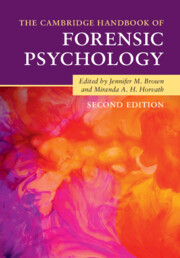Book contents
- The Cambridge Handbook of Forensic Psychology
- The Cambridge Handbook of Forensic Psychology
- Copyright page
- Dedication
- Contents
- Figures
- Tables
- Contributors
- Preface
- Forensic Psychology
- Part I Psychological Underpinnings
- Part II Psychology and Criminal Behaviour
- Part III Assessment
- Part IV Interventions
- Part V Civil Proceedings
- 5.1 Court Decisions about the Upbringing of Children
- 5.2 Parenting
- 5.3 Immigration, Asylum Seekers, and Refugees
- 5.4 Occupational Stress and Traumatic Stress
- 5.5 Capacity and Consent in the Criminal and Civil Contexts
- Part VI Professional Practices
- Index
- References
5.3 - Immigration, Asylum Seekers, and Refugees
from Part V - Civil Proceedings
Published online by Cambridge University Press: 02 December 2021
- The Cambridge Handbook of Forensic Psychology
- The Cambridge Handbook of Forensic Psychology
- Copyright page
- Dedication
- Contents
- Figures
- Tables
- Contributors
- Preface
- Forensic Psychology
- Part I Psychological Underpinnings
- Part II Psychology and Criminal Behaviour
- Part III Assessment
- Part IV Interventions
- Part V Civil Proceedings
- 5.1 Court Decisions about the Upbringing of Children
- 5.2 Parenting
- 5.3 Immigration, Asylum Seekers, and Refugees
- 5.4 Occupational Stress and Traumatic Stress
- 5.5 Capacity and Consent in the Criminal and Civil Contexts
- Part VI Professional Practices
- Index
- References
Summary
The refugee determination process is often lengthy and potentially re-traumatising for claimants. It is difficult for an asylum seeker to get heard in this bureaucratic process. These difficulties are exacerbated by the psychological factors involved. Trauma can have an impact on both the asylum seeker as well as the interviewer. While traumatic experiences can have significant effect on memory and disclosure. How, what and when asylum seekers disclose certain experiences during the refugee determination process can, in turn, affect their credibility. Likewise, limited country of origin information can play a part in negative credibility findings. This chapter discusses these key common areas of concern, namely trauma, memory and disclosure, country of origin information and credibility within the refugee determination process. Psychiatrists’ and psychologists’ wealth of knowledge in the field of trauma and memory and their implications can therefore be of crucial assistance in this context.
- Type
- Chapter
- Information
- The Cambridge Handbook of Forensic Psychology , pp. 684 - 696Publisher: Cambridge University PressPrint publication year: 2021



